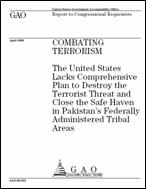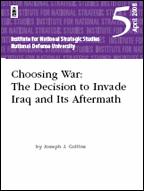Two New Reports Slam Bush on Iraq, Afghanistan
Two new reports released Thursday offer a devastating assessment of President Bush's leadership as commander-in-chief. First, the GAO concluded that "al-Qaeda had regenerated its ability to attack the United States and had succeeded in establishing a safe haven in Pakistan's border area." Then just hours later, a study from the National Defense University proclaimed the Iraq war "a major debacle" whose outcome was "in doubt." Together, they paint a damning portrait of Bush's failures in the global war on terror.
Following on the heels of last summer's National Intelligence Estimate, the Government Accountability Office report too lays waste to the myth of President Bush's "no safe havens" doctrine. As USA Today noted, Al Qaeda's free rein in the tribal areas comes despite a massive U.S. investment of resources in - and support for - the Musharraf government:
Of the $10.5 billion in aid provided to Pakistan since then, about $5.8 billion has been identified specifically for efforts along the border, mostly to reimburse Pakistan for military operations, according to GAO. Federal officials told the GAO that some 120,000 military and paramilitary forces have been deployed by Pakistan and hundreds of suspected al-Qaeda operatives have been killed or captured.
Last July, President Bush in the wake of the NIE admitted the failure of his no safe havens policy, one almost wholly dependent on General Pervez Musharraf to execute. During his July 21, 2007 radio address, Bush acknowledged:
"One of the most troubling [points in the NIE] is its assessment that al Qaeda has managed to establish a safe haven in the tribal areas of Pakistan bordering Afghanistan. Last September, President Musharraf of Pakistan reached an agreement that gave tribal leaders more responsibility for policing their own areas. Unfortunately, tribal leaders were unwilling and unable to go after al Qaeda or the Taliban."
Prospects for Al Qaeda's regeneration may have improved further in the wake of elections that saw Musharraf's allies defeated in parliament. The government of new Prime Minister Gilani has announced it will seek negotiations with militants near the Afghanistan border. (That announcement brought a worried Deputy Secretary of State John Negroponte to Islamabad, where he announced, "I don't see how you can talk with those kind of people.") No doubt, the U.S. will have to exercise great care with the newly elected government there even as it steps up unilateral strikes within Pakistani territory.
While the struggle to destroy those responsible for the 9/11 attacks continues to hit roadblocks in Pakistan, a punishing new study critiqued the war launched in Iraq against those who had nothing to do it with.
The study by the Pentagon's premier military education institute is all the more damaging given its author, Joseph Collins. Collins served as a senior DoD official working under Donald Rumsfeld and Paul Wolfwitz. And his assessment of the Iraq war's impact, based in part on interviews with other former senior officials, was brutally frank. Written last fall, the study ("Choosing War: The Decision to Invade Iraq and Its Aftermath") concluded:
"Measured in blood and treasure, the war in Iraq has achieved the status of a major war and a major debacle," says the report's opening line.
"No one as yet has calculated the costs of long-term veterans' benefits or the total impact on service personnel and materiel," wrote Collins, who was involved in planning post-invasion humanitarian operations.
The report said that the United States has suffered serious political costs, with its standing in the world seriously diminished. Moreover, operations in Iraq have diverted "manpower, materiel and the attention of decision-makers" from "all other efforts in the war on terror" and severely strained the U.S. armed forces.
"Compounding all of these problems, our efforts there (in Iraq) were designed to enhance U.S. national security, but they have become, at least temporarily, an incubator for terrorism and have emboldened Iran to expand its influence throughout the Middle East," the report continued.
Taken together, the two reports provide bookends for the foreign policy of the Bush administration. In Afghanistan and Pakistan, America's mortal enemy Al Qaeda remains unsubdued, safely ensconced in a safe haven President Bush has allowed to fester. Meanwhile, the conflict in Iraq has left U.S. forces overstretched, Iranian influence paramount and American prestige worldwide in tatters. No doubt, America is less safe thanks to the tenure of George W. Bush. To be sure, that constitutes a failing report card.
UPDATE: In a follow-up interview, Joseph Collins clarified that his "occasional paper" was in fact neither an NDU nor a Pentagon document. He notes that his paper "was mainly about the period 2002-04" and that:
"This study examines how the United States chose to go to war in Iraq, how its decision-making process functioned, and what can be done to improve that process. The central finding of this study is that U.S. efforts in Iraq were hobbled by a set of faulty assumptions, a flawed planning effort, and a continuing inability to create security conditions in Iraq that could have fostered meaningful advances in stabilization, reconstruction, and governance."



